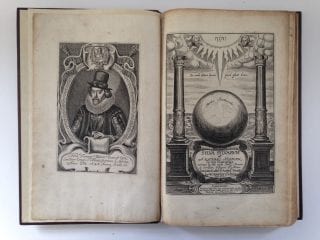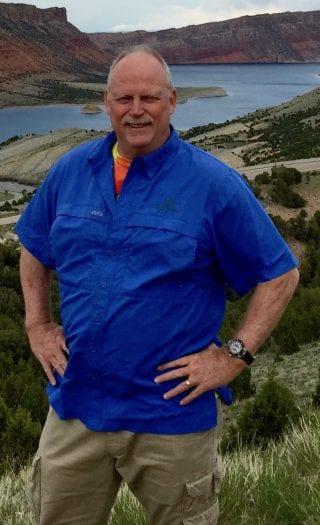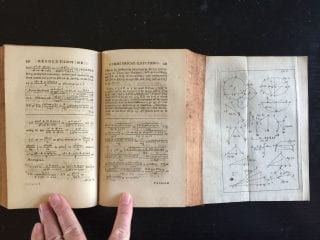A Q&A with Geosciences’ Christopher Liner
Christopher Liner, Ph.D.
Chair of the Department of Geosciences,
Storm Endowed Chair of Petroleum Geology
In this conversation, Liner talks about balancing his duties as department chair with teaching; his work to make the classroom experience challenging, interesting and fun; his passion for collecting and sharing rare books; and how much it means to him to be back at his undergraduate alma mater, helping the next generation of scholars to succeed.
Q: Tell us a little about your research, academic passions and/or role within the college. What excites you about this?
Much of my time these days is spent on all the issues related with being department chair of Geosciences.
It is a challenging job, but also a rewarding one that allows me to facilitate and help implement all the great ideas that come from our faculty and students. Just not getting in the way and not shutting down good ideas is a very important leadership function.
I also work closely with our Geosciences External Advisory Board who have had a dramatic impact on the department, including development of a Ph.D. program and establishment of endowments for the Maurice F. Storm Chair and Ph.D. fellowships.
Q: How long have you been at Fulbright College? What have you enjoyed most about your time here?
I joined the Fulbright College in 2012 after a long career at other universities in Tulsa and Houston, and at private companies including Conoco and Saudi Aramco.
As an undergraduate alumnus of University of Arkansas, my greatest pleasure has been to interact with the current generation of Geosciences students and help advise them based on my experience.
On becoming department chair in 2016, I enjoyed the wider circle of university faculty and staff that I came in contact with.
It did not take long to realize that any problem could be solved by picking up the phone and talking to the right people. Most problems are pretty easy to fix when you ask, “What is the course of action that most benefits the students of the University of Arkansas?”
Q: What do you most hope your students remember from their classes and/or interactions with you?
I teach Petroleum Geophysics and 3D Seismic Interpretation, and work to make the classroom experience challenging, interesting and fun.
We always have students make presentations with each class member judging and voting on which is ‘best’ (of course, grading is strictly in my hands). The winner gets an award memento, usually some form of an owl to signify wisdom.
Also, the top student in each class is declared to be the Senior Wrangler, which is a term used at Cambridge University since about 1750 for the top mathematics student each year.
Finally, whenever possible we have a class party to finish off the semester at a local pizza place to announce class awards.
Somewhere in all this activity, the students learn Geophysics, presentation skills and how to build a social network.

Title page and frontispiece from Francis Bacon’s Sylva Sylvarum (1639) printed three years before Isaac Newton was born. The Latin title means ‘Timber Forest’ and refers to the great ideas of natural philosophy that would become natural science at the hands of Newton and others who followed.
Q: What do you like to do during your time outside of the university?
My great interest away from the university is collecting rare books. This started back in the late 1970s right here in Fayetteville but jumped up a notch when I worked in London in the early 1980s.
From travels and living abroad, we now have about 300 books. My initial interests were 17th century books, Greek history, mathematics and natural sciences, but it has broadened over the years. I buy books that I want to read; that seems to be my only rule.
To mention a few particularly interesting items in the collection: Arithmetic (Isaac Newton, 1769, 3rd edition), The Origin of Species (Darwin, 1876, 6th ed), Bibles from 1603 and 1636, and a 1659 History of the World that was signed in 1666 – the year of plague and the great fire of London – only 3 libraries in North America have a copy of the 1659 History (Columbia, NY Public Library, Yale).
In the last few years, I have started to collect modern first editions, including James Bond books by Ian Fleming, Arthur Conan Doyle’s Sherlock Holmes, Dashiell Hammett (including The Maltese Falcon), the Raymond Chandler murder mysteries, literary giants including Faulkner, Hemingway and Steinbeck, and great science fiction authors including Asimov, Bradbury, Clarke and Heinlein.
The prize in the modern collection is a first edition copy of Mark Twain’s Huckleberry Finn. You can see I am excited about books.
Q: What’s up next on the horizon for you?
I have been working on a new book with a friend from my undergraduate days, Mac McGilvery.
The book is The Art and Science of Seismic Interpretation and was published by Springer in early 2019.
Going forward, I have another book project in mind and am interested in continuing seismic interpretation research through the honors, master’s and Ph.D. students I advise.
Q: Is there anything else you’d like to add or let readers know?
Back on the book collection topic: The only reason I was able to amass this collection was a career built on my University of Arkansas education.
To acknowledge that fact, my wife Dolores and I are working with Mullins Library to ultimately donate our books to Special Collections as a benefit to all students.
Finally, returning to the University of Arkansas as a faculty member and now department chair has been the greatest honor of my life.
Andra Parrish Liwag
Director of Communications, J. William Fulbright College of Arts and Sciences
479-575-4393 // liwag@uark.edu



